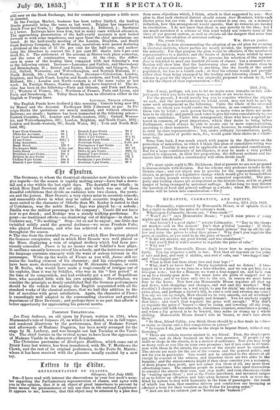Cbt ibtatrro.
The Germans, to whom the theatrical chronicler now directs his exclu- sive regards—for the season is rapidly melting away—have had a down- fall and a rise within the last eight days. The downfall was Othello ; in which Herr Emil Devrient did not play, and which was one of those dreadful exhibitions that divide an audience into two classes, the yawn- ers and the jesters. Herr Dessoir, a very clever actor in eccentric comedy, and reasonably clever in what may be called eccentric tragedy, but no more suited to the character of Othello than Mr. Keeley is suited to that of Coriolanus, was the noble Moor; Iago was played by—a nobody ; Emilia was the mildest personage in the company ; Cassie did not know how to get drunk ; and Rodrigo was a stately walking gentleman. No point—no traditional effects—no shadowing out of dialogue—in short, as Cocknies say, "No nothing." Stop—let us not be unjust : one little star twinkled mildly amid the general darkness—we mean Fraulein Fuhr, who played Desdemona, and who has achieved a nice quiet success throughout the season.
04 The rise from the downfall was Fiesco ; in which Herr Devrient played the Genoese conspirator, and in which Herr Dessoir was well placed as the Moor, displaying a vein of original drollery which had been pre- viously concealed. Fieseo is by no means one of Schiller's best plays. It oscillates uneasily between two of his schools, and the boisterous tone of the language contrasts strangely with the want of serious interest in the personages. Write up the words of Fiesco as you will, finesse still re- mains the leading element of his character; and his conspiracy could have been more dexterously managed by M. Alexandre Dumas, or even by M. Scribe, who would have made a tragi-comedy of intrigue out of his exploits, than it was by Schiller, who was in his "first period" at the time of its composition, and had evidently got a sort of Republican hero, who accorded little with his own sympathies. Nevertheless, we consider the principle so firmly established that the German performances should be the vehicle for making the English acquainted with all the standard works of the classical authors, that we hail this addition• to the list of novelties with great satisfaction. Again, the character of Fiesco is exceedingly well adapted to the commanding elocution and graceful deportment of Herr Devrient ; and perhaps there is no part that affords a better opportunity for appreciating his general merits.


























 Previous page
Previous page